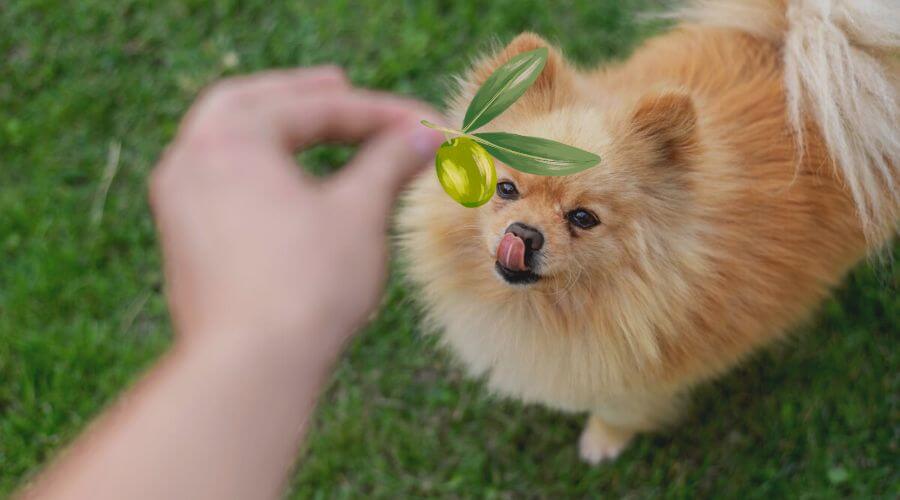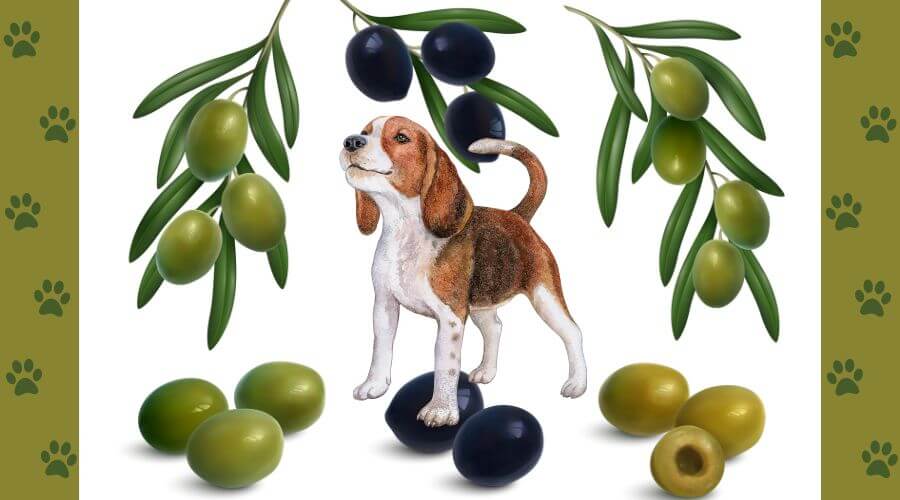Can Dogs Eat Olives?
- Yes, dogs can eat olives! ✔️
- Olive pits are not toxic to dogs, but can cause intestinal blockages and other digestive problems. ⚠️
- Green olives may contain lye, which is toxic to dogs. ⚠️
- Black olives are richer in polyphenol, but also contain more fat. ⚠️
- Pickled and fresh olives are safe for dogs in moderation. ✔️
- Canned olives should not be given to dogs because they may contain lye or be high in sodium. ❌
- Olive oil is not recommended for dogs because it is high in fat and contains oleic acid. ❌
What Are the Potential Benefits of Olives for Dogs?
Can dogs eat olives? What are their health benefits? Olives provide many of the same nutrients as other vegetables. They are a good source of fiber, vitamins A, C and E, and minerals such as potassium. They also contain polyphenols, which are antioxidants that can help protect your dog’s cells from damage.

Why Can Olives Be Bad for Dogs?
Olives contain a compound called oleuropein, which is toxic to dogs in high doses. If your dog eats too many olives, he may experience vomiting and diarrhea. The symptoms of canine olive poisoning can include:
- vomiting;
- diarrhea;
- abdominal pain;
- cramping.
In severe cases, olive poisoning may lead to pancreatitis or liver failure in dogs. If your dog has eaten a large amount of olives, contact your veterinarian immediately. There is no antidote for olive poisoning, but your veterinarian may be able to provide treatment to help manage the symptoms.
Watch Out for the Pits!
Can dogs eat olives with pits? Though olive pits are not necessarily toxic to dogs, they aren’t entirely safe either. They can cause intestinal blockages and other digestive problems in dogs. If your dog swallows an olive pit, contact your vet.
Green Olives May Contain Lye
If you were to give your dog olives of any kind, it’s probably better to go with black ones. Black olives are different from green olives in that they have been ripened on the tree and then picked.
Green olives are not ripe and have been treated with a lye solution to remove their bitterness. Lye is toxic to dogs and can cause stomach upset, vomiting, diarrhea, abdominal pain and cramps. It has also been known to cause kidney failure in extreme cases of poisoning.
Black Olives Are Richer in Polyphenol
Another argument in favor of black olives is that they have a higher polyphenol concentration. Polyphenols are antioxidants that offer many health benefits, including reducing the risk of heart disease and cancer. On the other hand, black olives also contain more fat than green olives, which in the long run can cause pancreatitis in some dogs.
Are Canned or Pickled Olives Safe for Dogs?
Can dogs eat olives that are pickled or canned? Pickled olives are made by pickling black and green olives in a vinegar or brine solution. Plain vinegar is actually good for dogs in that it helps with digestive problems such as diarrhea and constipation. Therefore, pickled olives are safe for dogs to eat in moderation.
Canned olives, however, have been treated with a lye solution to remove their bitterness. Don’t give them to your dog! Another reason why canned olives are bad for dogs is because they are high in sodium.
Editor’s Note 🐕
Dogs should not consume sodium as it can lead to weight gain and health problems like hypertension and heart disease. Always opt for low-sodium options such as fresh or pickled olives.

Can Dogs Have Olive Oil?
Olive oil is not recommended for dogs. It contains oleic acid, which is a type of fatty acid that has been shown to increase the risk for developing heart disease in dogs.
Olive oil can also cause pancreatitis in some dogs, and irritate the digestive tract. If you are feeding your dog olive oil, make sure he gets plenty of water to drink, so his body does not get dehydrated from all of that fat going through his system!
Healthy Olive Alternatives for Your Pup
There are several dog-friendly alternatives to olives. One is to give your dog cooked green beans or chikpeas instead. Another option is to give your dog vegetables like celery, carrot, bell pepper or cucumber.
Can Dogs Eat Olives?
Yes – as long as they are black, plain, pitted and not from a can. Unless you’re able to ensure all of these conditions, it’s probably better if this fruit remains a forbidden one.
Frequently Asked Questions
Are Green Olives Ok for Dogs?
The short answer is yes, green olives are generally considered safe for dogs to eat in small amounts. However, olives should always be given as an occasional treat, not as a regular part of your dog’s diet.
What If My Dog Eats an Olive Pit?
If your dog accidentally swallows an olive pit, it could potentially cause a blockage in the gastrointestinal tract. In this case, you should call your veterinarian immediately for advice and to determine if medical attention is necessary.
How Many Olives Can Dogs Eat?
In general, you should not give your dog more than one or two olives at a time as part of an occasional treat.
Can Dogs Eat Olives With Pimentos?
Pimentos are not toxic to dogs, so it is safe to give your pup olives with pimentos as a special treat.
Similar Posts:
- Can Dogs Eat Cherries? Are Dried Cherries Safe for Dogs?
- Can Dogs Eat Kidney Beans? The Safety and Health Benefits of Beans
- Can Dogs Eat Beans? What Kinds of Beans Are Safe For Dogs?
- Can Dogs Eat Pickles? The Pros and Cons of Letting Your Dog Eat Pickles
- Can Dogs Eat Peaches & Peach Pits? Tips for Dog Owners
- Can Dogs Eat Lettuce? The Pros and Cons & How to Make It Safe for Dogs
- Can Dogs Eat Oysters? Risks of Feeding Your Dog This Seafood
- Can Dogs Eat Pizza or Pizza Crust Safely?

